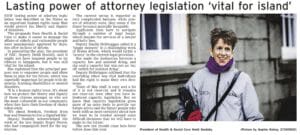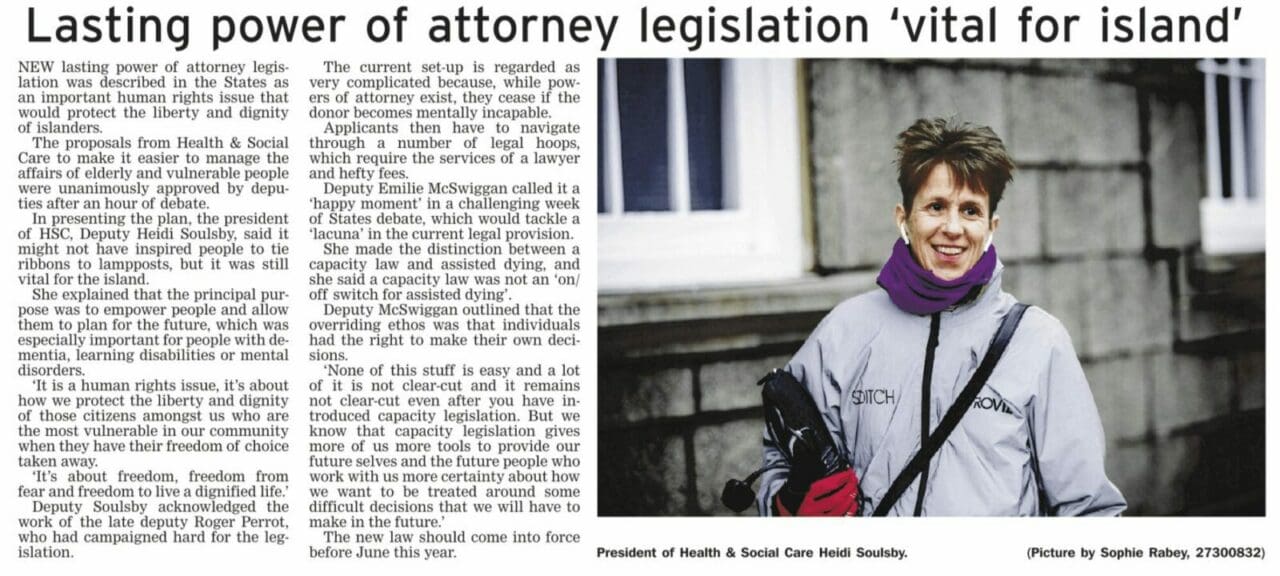April 22, 2020
On 26th February the States of Deliberation unanimously approved proposals to draft a new Capacity Law
You can view media reports at:
- ITV news website
- Guernsey press article

The States agreed on the 22nd April 2020 to approve the draft Projet de Loi entitled “The Capacity (Bailiwick of Guernsey) Law, 2020“, and to authorise the Bailiff to present a petition to Her Majesty praying for Her Royal Sanction.
The Capacity (Bailiwick of Guernsey) Law, 2020 is largely based on the provisions of the English Mental Capacity Act 2005 (as subsequently amended), but is intended to take into account the current processes and requirements of the Bailiwick.
The main parts of the Law are:
Part 1 (Preliminary)
Sets out the key interpretative provisions, defining terms which are used throughout the Law, and lists the decisions which may not be made on behalf of a person who lacks capacity under the Law.
Part 2 (Persons who lack capacity)
States the principles of the Law (e.g. a person is assumed to have capacity unless it is established that they lack capacity), lists what
must be proved before a person lacks capacity and enshrines the key principle that any decisions taken on behalf of a person who lacks capacity must be made in the best interests of that person.
Part 3 (Powers of and applications to court and tribunal)
Sets out the general powers of the court and the Mental Health and Capacity Review Tribunal.
Part 4 (Lasting powers of attorney)
Introduces lasting powers of attorney which allow a grantor (a person with capacity) to appoint an attorney who may deal with their health and welfare, or property and financial affairs, or both, when the grantor no longer has capacity.
Part 5 (Advance decisions to refuse treatment)
Establishes ADRTs (also known as living wills) which allow a person with capacity to make a decision to refuse specified treatment when they no longer have capacity.
Part 6 (Advanced care plans)
Allows a person to make an advanced care plan setting out their wishes in relation to the care and treatment that they would wish to receive when they lack capacity (including interests, food and even funeral arrangements).
Part 7 (Independent capacity representatives)
Establishes the role of ICRs who have the function of assisting persons who lack capacity and may challenge decisions taken on their behalf.
Part 8 (Protective authorisation scheme)
Introduces the concept of a “significant restriction of a person’s personal rights” (which is defined as a deprivation of liberty in accordance with ECHR case law). This scheme will give clear legal power for e.g. care placements and hospitals to ensure that people who lack capacity remain in safe environments for the purposes of their treatment and care, and is the equivalent of the Deprivation of Liberty Safeguards and Liberty Protection Safeguards schemes in England and Wales. Protective authorisations may be issued or reviewed by Capacity Professionals (who are independent decision-makers in the same vein as Approved Social Workers under the Mental Health (Bailiwick of Guernsey) Law, 2003.
Part 9 (Safeguarding)
Provides the States with an Ordinance-making power to make provision for safeguarding measures in relation to vulnerable persons aged 18 or over.

